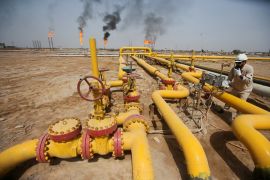The redistribution of oil profits has appeased the political elites, but the peace and quiet will not last long.

The redistribution of oil profits has appeased the political elites, but the peace and quiet will not last long.

The violence after Muqtada al-Sadr’s resignation may have stopped for now, but the country’s crisis has only deepened.

But only if they unite.
![Hassan Al-Adari, head of the political body of the Sadrist bloc and Sadrists delegation meets with Hoshyar Zebari, head of the Kurdish delegation to negotiations on forming the new government after the parliamentary elections in Baghdad on November 5, 2021 [File: AP/Hadi Mizban]](https://www.aljazeera.com/wp-content/uploads/2021/12/AP21309381474155.jpg?resize=270%2C180&quality=80)
These groups are undermining efforts to improve Erbil-Baghdad relations and reestablish security in the north.
![Fighters of the Hashed al-Shaabi paramilitary forces carry the coffins of fellow fighters, who were killed in an ambush on a desolated road south of Mosul, during a funeral in their hometown in the northern Iraqi town of Tuz Khurmatu near the city of Kirkuk, on March 7, 2019 [File: AFP/Marwan Ibrahim]](https://www.aljazeera.com/wp-content/uploads/2021/05/000_1EC48E.jpg?resize=270%2C180&quality=80)
Disagreement in Baghdad over the presence of US troops threatens to destabilise the country.

Since 2003, Iraq has not seen the type of upheaval it witnesses today. Could it lead to genuine political change?
